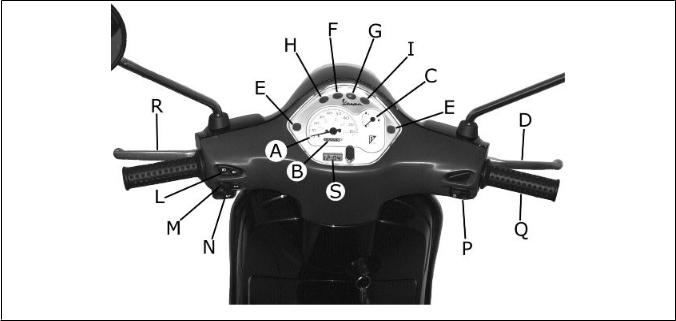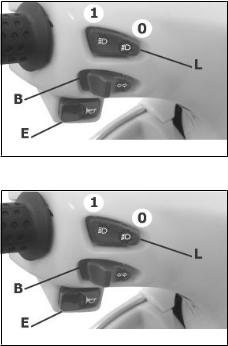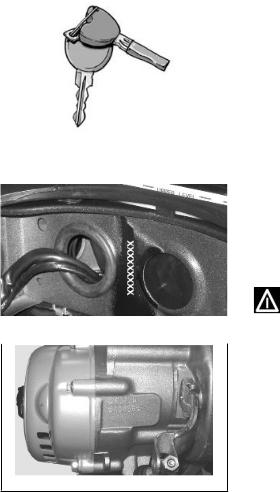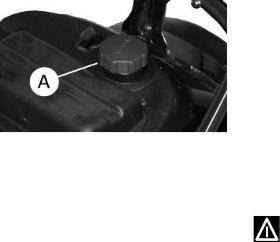PIAGGIO VESPA User Manual

Vespa would like to thank you
for choosing one of its products. We have prepared this manual to help you to get the very best from your vehicle. Please read it carefully before riding the vehicle for the first time. It contains information, tips and precautions for using your vehicle. It also describes features, details and devices to assure you that you have made the right choice. We believe that if you follow our suggestions, you will soon get to know your new vehicle and it will serve you well for a long time to come. This booklet forms an integral part of the vehicle; should the vehicle be sold, it must be transferred to the new owner.
Vespa LX 50
The instructions given in this manual are intended to provide a clear, simple guide to using your vehicle; this booklet also details routine maintenance procedures and regular checks that should be carried out on the vehicle at an authorised Dealer or Service Centres. The booklet also contains instructions for simple repairs. Any operations not specifically described in this booklet require the use of special tools and/or particular technical knowledge: to carry out these operations, refer to any authorised Dealer or Service Centres.
2

Personal safety
Failure to completely observe these instructions will result in serious risk of personal injury.
Safeguarding the environment
Sections marked with this symbol indicate the correct use of the vehicle to prevent damaging the environment.
Vehicle intactness
The incomplete or non-observance of these regulations leads to the risk of serious damage to the vehicle and sometimes even the invalidity of the guarantee.
The signs that you see on this page are very important. They are used to highlight parts of the booklet that should be read with particular care. The different symbols are used to make each topic in the manual simple and quick to locate.
3
4
VEHICLE...................................................................................... |
7 |
Dashboard................................................................................ |
8 |
Clock......................................................................................... |
10 |
Key switch................................................................................. |
10 |
Locking the steering wheel.................................................... |
10 |
Releasing the steering wheel................................................ |
11 |
Switch direction indicators........................................................ |
11 |
Horn button............................................................................... |
12 |
Light switch............................................................................... |
12 |
Start-up button.......................................................................... |
13 |
Opening the saddle............................................................... |
13 |
Keys.......................................................................................... |
14 |
Identification.............................................................................. |
14 |
Rear top box opening................................................................ |
15 |
Bag clip..................................................................................... |
15 |
USE.............................................................................................. |
17 |
Checks...................................................................................... |
18 |
Refuelling.................................................................................. |
18 |
Tyre pressure............................................................................ |
20 |
Running in................................................................................. |
21 |
Starting up the engine............................................................... |
21 |
Difficult start up......................................................................... |
22 |
Stopping the engine.................................................................. |
23 |
Catalytic silencer....................................................................... |
24 |
Automatic transmission............................................................. |
24 |
Safe driving............................................................................... |
25 |
MAINTENANCE........................................................................... |
27 |
Hub oil level.............................................................................. |
28 |
Tyres......................................................................................... |
29 |
Spark plug dismantlement........................................................ |
30 |
Removing the air filter............................................................... |
31 |
Secondary air system............................................................... |
32 |
Intake plug................................................................................ |
32 |
|
INDEX |
Checking the brake oil level...................................................... |
33 |
Battery....................................................................................... |
34 |
Checking the electrolyte level................................................ |
35 |
Long periods of inactivity.......................................................... |
36 |
Fuses........................................................................................ |
37 |
Front light group........................................................................ |
39 |
Headlight adjustment............................................................. |
40 |
Front direction indicators........................................................... |
41 |
Rear optical unit........................................................................ |
41 |
Rear turn indicators................................................................... |
42 |
Rear-view mirrors...................................................................... |
42 |
Idle adjustment.......................................................................... |
43 |
Front disc brake........................................................................ |
43 |
Rear drum brake....................................................................... |
44 |
Puncture.................................................................................... |
45 |
Periods of inactivity................................................................... |
45 |
Cleaning the vehicle.................................................................. |
46 |
TECHNICAL DATA...................................................................... |
51 |
Toolkit....................................................................................... |
54 |
SPARE PARTS AND ACCESSORIES........................................ |
55 |
Warnings................................................................................... |
56 |
SCHEDULED MAINTENANCE.................................................... |
57 |
Scheduled servicing table......................................................... |
58 |
5
6

Vespa LX 50
Chap. 01
Vehicle
7
Dashboard (01_01)
A = Speedometer
B = Odometer
C = Fuel gauge
D = Front brake control lever
E = Turn indicator warning light
F = Mixer oil reserve warning light
G = High-beam warning light
H = Low fuel warning light
I = Low-beam/side lights warning light
L = High/low beam switch
M = Turn indicator switch
N = Horn button
P = Starter button
Q = Throttle grip
R = Rear brake control lever
S = Digital clock
1 Vehicle
8

Vehicle 1
01_01
9

1 Vehicle
Clock (01_02)
Hours and minutes are displayed in a 1 to 12, AM or PM, format on the instrument panel.
Operating the function selection switch «T» month, day and seconds can be seen besides hours and minutes. In order to adjust the above mentioned functions, operate button «U». The digital clock is powered by a battery (battery life is about 2 years); lift the whole instrument panel to replace the battery. It is advisable to take your vehicle to an Authorised Service Centre for this operation.
WARNING
01_02
DEAD BATTERIES ARE HARMFUL TO THE ENVIRONMENT. THEY MUST DISPOSED OF IN SUITABLE CONTAINERS AS PRESCRIBED BY THE REGULATIONS IN FORCE.
Key switch (01_03)
LOCK = Ignition disabled, extractable key, steering lock engaged front glove-box locked.
OFF = Ignition disabled, extractable key, steering lock disengaged, front glove-box unlocked.
ON = Ready to start position, anti-theft device disabled, non-extractable key, glovebox unlocked.
01_03
Locking the steering wheel
Turn the handlebar to the left (as far as it will go), turn the key to «LOCK» and remove the key.
10

CAUTION
DO NOT TURN THE KEY TO «LOCK» OR «KEY OFF» WHILE RIDING.
Releasing the steering wheel
Reinsert the key and turn it to «OFF».
CAUTION
DO NOT TURN THE KEY TO «LOCK» OR «KEY OFF» WHILE RIDING.
Switch direction indicators (01_04)
To set the left turn indicators flashing, move lever «B» to the left; to set the right turn indicators flashing, move it to the right. The lever automatically returns to the central position and the indicators remain on. To turn the indicators off, press the lever towards the switch.
01_04
Vehicle 1
11

Horn button (01_05)
Horn button «E»
01_05
Light switch (01_06)
0 = Low-beam and tail light
1 = High-beam and tail light
01_06
1 Vehicle
12

Start-up button (01_07)
To start the engine, press the starter button, «P», after pulling either one of the two brake levers.
01_07
Opening the saddle (01_08)
Insert the key into the saddle lock «A», turn it anticlockwise and tip the saddle forward.
01_08
Vehicle 1
13

1 Vehicle
|
|
Keys (01_09) |
|
|
|||
|
|
The vehicle is supplied with two keys (one spare) which serve to start the engine and |
|
|
|
unlock the saddle compartment. The keys are accompanied by a tag marked with the |
|
|
|
identification code to be quoted when ordering duplicates. |
|
|
|
|
|
|
|
WARNING |
|
|
|
WE RECOMMEND KEEPING THE DUPLICATE KEY TOGETHER WITH ITS CODE |
|
|
|
IN A SAFE PLACE AND NOT ON THE VEHICLE |
|
01_09 |
|
|
|
|
|
Identification (01_10, 01_11) |
|
|
|
||
|
|
The identification numbers consist of a prefix stamped on the chassis and on the en- |
|
|
|
gine, followed by a number. They should always be given when requesting spare |
|
|
|
parts. We recommend that you check that the prefix and chassis number stamped on |
|
|
|
the vehicle correspond with those in the vehicle documents. |
|
|
|
|
|
|
|
CAUTION |
|
01_10 |
|
BE REMINDED THAT ALTERING IDENTIFICATION REGISTRATION NUMBERS |
|
|
|
||
|
|
CAN LEAD TO SERIOUS PENAL SANCTIONS (IMPOUNDING OF THE VEHICLE, |
|
|
|
||
|
|
ETC.). |
|
01_11
14

Rear top box opening
Turn the key to «OFF». Then press it. When the key is set to «LOCK», the glove-box is locked.
Bag clip (01_12)
To use the retractable bag hook «B» located at the front end of the saddle, pull it forward lightly.
01_12
Vehicle 1
15
1 Vehicle
16

Vespa LX 50
Chap. 02
Use
17

2 Use
|
|
Checks |
|
|
Before using the vehicle, check: |
|
|
1.That the petrol tank and the oil reservoir are full. |
|
|
2.Rear hub oil level. |
|
|
3.That the tyres are properly inflated. |
|
|
4.The correct functioning of headlights, rear light and turn indicators. |
|
|
5.The correct functioning of front and rear brakes. |
|
|
6.The fluid level in the brake pump reservoir. |
|
|
Refuelling (02_01, 02_02) |
|
||
|
|
Fill fuel tank «A» with unleaded petrol with a minimum octane rating of 95. |
|
|
The low fuel warning light on the instrument panel turns on to signal low fuel (see the |
|
|
"Control Panel" section). |
|
|
Top up oil tank «B» using recommended oil. The oil warning light on the instrument |
|
|
panel turns on to signal oil minimum level (see the "Control Panel" section). |
|
|
Should this warning light turn on, the oil tank should be topped-up at the following |
|
|
refuelling and in any case before travelling another 150 km. |
02_01 |
|
When turning the key «ON», the oil warning light turns on for a few seconds indicating |
|
the correct functioning of the bulb and oil reserve circuit. |
|
|
|
|
|
|
If the warning light fails to come on, it is faulty. Should this happen, contact an Au- |
|
|
thorised Piaggio Service Centre. |
|
|
|
|
|
CAUTION |
SHUT OFF THE ENGINE BEFORE REFUELLING WITH PETROL. PETROL IS
HIGHLY FLAMMABLE. DO NOT LET PETROL SPILL FROM THE TANK OR WHILE
REFUELLING
18

|
|
CAUTION |
|
|
|
DO NOT BRING NAKED FLAMES OR CIGARETTES NEAR THE MOUTH OF THE |
|
|
|
FUEL TANK: FIRE HAZARD. ALSO AVOID INHALING HARMFUL VAPOURS. |
|
02_02 |
|
IMPORTANT: NEVER EMPTY THE MIXER OIL RESERVOIR. |
|
|
|
|
|
|
|
CAUTION |
|
|
|
THE USE OF OILS AND SPARK PLUGS OTHER THAN THOSE RECOMMENDED |
|
|
|
CAN SHORTEN THE LIFE OF THE ENGINE. |
|
|
|
Recommended products |
|
|
|
AGIP CITY HI TEC 4T |
|
|
|
Oil to lubricate flexible transmissions (brake, throttle control and mixer, odometer) |
|
|
|
Oil for 2-stroke engines: SAE 5W-40, API SL, ACEA A3, JASO MA |
|
|
|
Characteristic |
|
oil mixer tank
Plastic, capacity ~ 1.2 l
Topping up mixer oil reservoir
Topping up oil reservoir: 0.5 ÷ 0.7 l
Fuel tank capacity
~ 8.5 l (2 l of which is reserve)
Use 2
19

Tyre pressure
CAUTION
TYRE PRESSURE SHOULD BE CHECKED WHEN TYRES ARE COLD.INCOR-
RECT TYRE PRESSURE CAUSES ABNORMAL TYRE WEAR AND MAKES RID-
ING DANGEROUS.
TYRES MUST BE REPLACED WHEN THE TREAD REACHES THE WEAR LIMITS
SET FORTH BY LAW.
Characteristic
Front tyre pressure
1.6 bar
Rear tyre pressure
2 bar
Rear tyre pressure - driver and passenger
2.2 bar
2 Use
20

|
|
Running in (02_03) |
|
|
|||
|
|
|
|
|
|
WARNING |
|
|
|
DURING THE FIRST 1000 KM DO NOT RIDE THE VEHICLE OVER 80% OF ITS |
|
|
|
MAXIMUM SPEED. AVOID TWISTING THE THROTTLE GRIP FULLY OR KEEP- |
|
|
|
ING A CONSTANT SPEED ALONG LONG SECTIONS OF ROAD. AFTER THE |
|
|
|
FIRST 1000 KM, GRADUALLY INCREASE SPEED UNTIL REACHING THE MAX- |
|
02_03 |
|
IMUM PERFORMANCE. |
|
|
|
Starting up the engine (02_04) |
|
|
|
||
|
|
The vehicle is fitted with automatic transmission with a regulator and centrifugal clutch. |
|
|
|
Therefore always start the engine with the throttle at idle speed; to start-off from sta- |
|
|
|
tionary position, progressively twist the throttle grip. |
|
|
|
The vehicle is equipped with a fuel valve and a starter which switch on automatically |
|
|
|
as soon as the engine is started. |
|
In order to start the engine, it is necessary to pull either the rear brake lever «B » or the front brake lever «C», before pressing the starting button, "A ", so as to disengage
the safety switches.
02_04
1:Put the scooter on its stand "E"; check that the rear wheel is off the ground.
2:Keep the throttle closed.
3:Insert the key into the ignition switch, "D", and turn to the ON position.
4:Push the starter button «A» after pulling the rear brake lever «B» or the front brake lever «C».
Use 2
21
